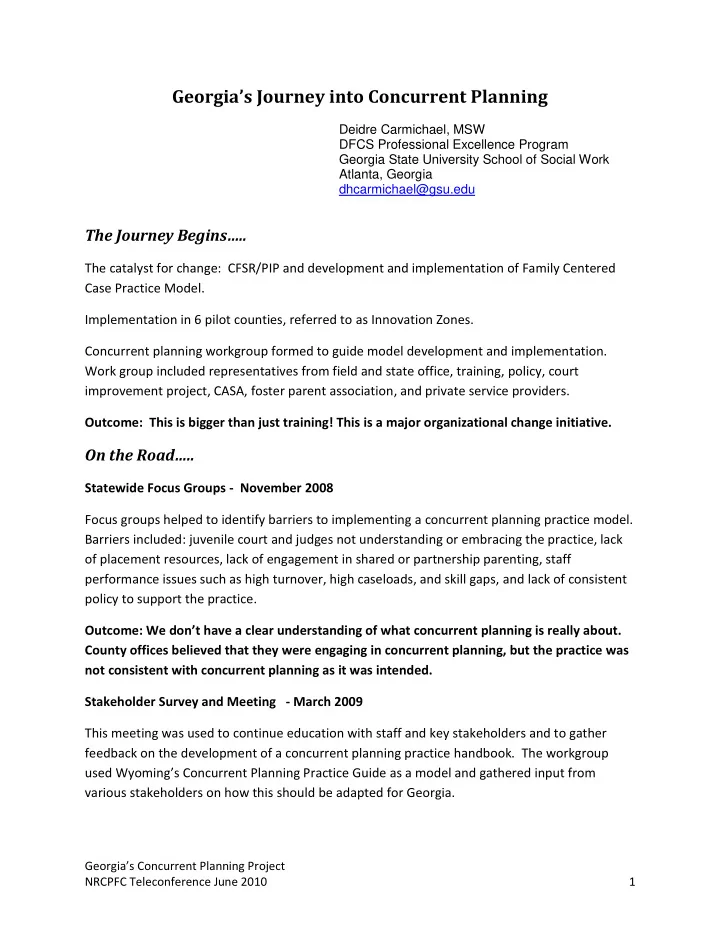

Georgia’s Journey into Concurrent Planning Deidre Carmichael, MSW DFCS Professional Excellence Program Georgia State University School of Social Work Atlanta, Georgia dhcarmichael@gsu.edu The Journey Begins….. The catalyst for change: CFSR/PIP and development and implementation of Family Centered Case Practice Model. Implementation in 6 pilot counties, referred to as Innovation Zones. Concurrent planning workgroup formed to guide model development and implementation. Work group included representatives from field and state office, training, policy, court improvement project, CASA, foster parent association, and private service providers. Outcome: This is bigger than just training! This is a major organizational change initiative. On the Road….. Statewide Focus Groups - November 2008 Focus groups helped to identify barriers to implementing a concurrent planning practice model. Barriers included: juvenile court and judges not understanding or embracing the practice, lack of placement resources, lack of engagement in shared or partnership parenting, staff performance issues such as high turnover, high caseloads, and skill gaps, and lack of consistent policy to support the practice. Outcome: We don’t have a clear understanding of what concurrent planning is really about. County offices believed that they were engaging in concurrent planning, but the practice was not consistent with concurrent planning as it was intended. Stakeholder Survey and Meeting - March 2009 This meeting was used to continue education with staff and key stakeholders and to gather feedback on the development of a concurrent planning practice handbook. The workgroup used Wyoming’s Concurrent Planning Practice G uide as a model and gathered input from various stakeholders on how this should be adapted for Georgia. Georgia’s Concurrent Planning Project NRCPFC Teleconference June 2010 1
Key Findings: Barriers to implementation entered around three primary issues: the lack of appropriate resource families, the mindset/attitudes of staff and resource families, and issues with the court. Some respondents felt that concurrent planning should be used for all children in care, while others indicated a preference toward focusing these efforts on younger children. Some respondents indicated the importance of considering all children adoptable, while others felt that long-term foster care should be considered a viable permanency option for some children, under some circumstances. Need to revise the current approval process and training requirement for foster parents, recruit the right type of foster parents who have the capability to work collaboratively with birth families, and have DFCS staff work more closed with foster parents around these issues. Support needed to implement the practice: enough workers to guarantee a manageable caseload, support to influence the courts to move faster on cases, assistance with recruiting, training and maintaining a sufficient number of resource homes, training, specialized caseloads, policy revision Outcome: More awareness about the practice, engagement of stakeholders in the process Practice model development Practice model development continued with the input gained from focus groups, stakeholder meeting, survey, workgroup, and NRC consultant. The primary challenge was melding of best practice with policy and integration into current case process system , which includes the state’s SACWIS system. Also, there were other workgroups convening at the same time on related issues so communication and collaboration was critical. The primary related issue was the partnership parenting effort. Outcomes: Georgia Concurrent Planning Practice Handbook and Concurrent Planning Policy- first draft July 2009; revised January 2010 Innovation Zone Implementation Meetings w/NRC consultant – July 2009 This meeting provided another opportunity for education with staff and also put a focus on what people needed to actually do to prepare for implementation. Outcome: Awareness that this was not just another “initiative . ” Each county began development of an implementation plan specific to their county. Georgia’s Concurrent Planning Project NRCPFC Teleconference June 2010 2
Training Needs Assessment – June/July 2009 Focus groups conducted with staff from each of the six innovation zone counties. Also, considered feedback provided in focus groups and stakeholder meetings. Outcome: Key decisions regarding curriculum development and training delivery: Include all social services staff, not just Foster Care staff. Include all levels of DFCS staff , including administrators Provide training for key stakeholders in addition to DFCS staff Make efforts to develop internal capacity of county staff (individuals who can become “experts” in concurrent planning and be a resource to other staff) Develop pre and post training support to promote transfer of learning Consider a post-training workshop series Provide technical assistance by NRC Curriculum Design Process - August – December 2009 Design and development using ADDIE model Curriculum run through and feedback session with workgroup Train the Trainer session Pilot training with innovation zone staff Outcome: Training curriculum, pre-training activity, transfer of learning action plan Are We There Yet?.... Innovation Zone staff trained January – February 2010 Technical assistance sessions with NRC consultant – April 2010 Other trainings for special audiences: Quality assurance staff, field program specialists, Child Placement Conference, Resource Development staff, Juvenile Court Trainer debrief/feedback session Classroom evaluation reviews Family Centered Practice implementation debrief meeting with Innovation Zones – May 2010 Yet to be done….. revisions to practice handbook, policy, and training in preparation for statewide rollout of the Family Centered Practice model Georgia’s Concurrent Planning Project NRCPFC Teleconference June 2010 3
Recommend
More recommend